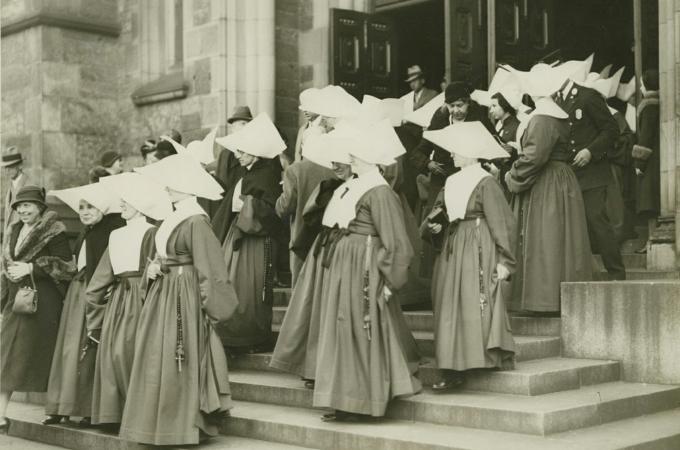Records of Delegate for Religious available for research
The Archive Department is pleased to announce that records of the Delegate for Religious have been processed and a collection guide is now available to researchers.
The Delegate for Religious is the primary liaison for the more than 2,000 men and women religious in the Archdiocese of Boston, serving as the main point of contact between the religious communities and the Archbishop of Boston. Since May 1, 2019, the position has been held by Sister Germana Santos, FSP, who contributed greatly to the task of assessing and organizing her predecessors' records.
The history of the office originates in the 1960s when, following the conclusion of the Second Vatican Council in 1965, it became evident that there needed to be a designated office to facilitate communication between Church leadership and the members of the religious communities that serve in each diocese. To accomplish this, the National Conference of Vicars for Religious (NCVR) was established in 1968, with the objective of defining the purpose of the office and outline the responsibilities and activities the incumbent was expected to perform to achieve their goals.
Soon after the creation of the NCVR, an office of the Vicar for Religious was established in the Archdiocese of Boston. The role was further clarified and expanded in a May 14, 1978, document entitled "Mutuae Relationes," co-authored by the Congregation for Religious and for Secular Institutes (today known as Congregation for Institutes of Consecrated Life and Societies of Apostolic Life) and the Congregation for Bishops.
The document stated that "it is advisable that the office of episcopal vicar for religious be set up in the diocese to render a service of collaboration, in this field, with the pastoral ministry of the bishop."
It continues that "it is up to each residential bishop to determine clearly the specific competencies of such an office and, after careful examination, entrust it to a competent person, well acquainted with the religious life, who knows how to appreciate it and desires to see it prosper." The position should "be set up in the diocese to render a service of collaboration, in this field, with the pastoral ministry of the bishop." Lastly, it points out that "the mandate, then, of episcopal vicar for religious congregations consists in helping accomplish a task which of its nature pertains exclusively to the bishop, that is, watching over religious life in the diocese and integrating it into its complex of pastoral activities."
As the name has since changed from Vicar for Religious to Delegate for Religious so, too, have the services the office provided continued to evolve over time. In addition to the primary role of facilitating communication between religious congregations and the archbishop, the delegate also serves as a resource for male and female congregations, maintaining lists of all residences, ministry assignments, and members active within the archdiocese.
The office also helps plan and coordinate special events, such as annual meetings of the major superiors of men and women religious and the annual Collection for Retired Sisters each November, which directly benefits the congregations, providing for the healthcare needs of retired religious who have served within the Archdiocese of Boston. It also falls upon the delegate to plan events and programs that promote vocation awareness for consecrated life, such as celebrating the World Day for Consecrated Life on Feb. 2 of each year and jubilee celebrations for the brothers and sisters residing in the archdiocese.
This collection might interest researchers wishing to examine the role of men and women religious in the archdiocese as well as those interested specifically in the role of Vicar/Delegate for Religious. Records include event programs, material related to social issues for which religious communities have advocated and other records of an administrative nature. It is worth noting that the archdiocese does not maintain personnel records of men and women religious, those records can be requested from the individual's specific community.
CHRISTINA STANKEWICZ IS AN ARCHIVIST FOR THE ARCHDIOCESE OF BOSTON.



















